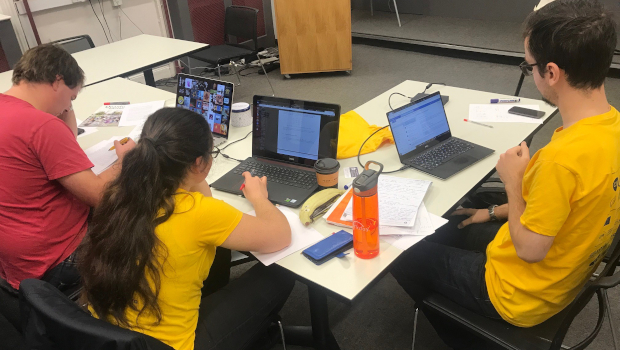
Connect hosts pan-European Quantum Internet hackathon
The Connect Centre at Trinity College Dublin is hosting the Dublin node of a pan-European Quantum Internet Hackathon this week. The event, which involves several dozen participants, takes place simultaneously in six European locations including CERN in Geneva, Paris, Sarajevo, Padua and Delft.
“The Dublin team includes network engineers, mathematicians and
telecommunications researchers drawn from Maynooth University, Trinity College Dublin, and Waterford Institute of Technology,” said Dr Harun Šiljak, organiser of the hackathon at Connect in Trinity. “It’s not a competition, so the aim is to develop new skills, share ideas, and hopefully receive some inspiration for future research.”
“It is a pioneering event, applying quantum mechanics to the area of secure communications. We are looking at how this can be applied to the problems of today’s internet, especially issues such as security and privacy. Everyday uses such as e-mail, chat, and secure browsing can all benefit from the integration of quantum methods, and these areas are being explored this week.
“The Dublin team is focusing, in particular, on solving the challenge of making a quantum coin. This quantum communication-supported currency has all the advantages of quantum security, making it virtually impossible to forge and guaranteeing ease of use and verification.”
“The quantum internet is not replacing the existing infrastructure,” said Šiljak. “It is enhancing it with the advantages offered by quantum mechanics. Synchronisation, consensus, security, all of these critical features of networks can be enormously improved using the most famous of quantum
properties: the entanglement. A large number of quantum protocols have been developed by researchers and professionals worldwide, and hackathon participants have the opportunity to implement them, suggest improvements and examine their performance in practice.”
In the absence of a quantum network between the European nodes of the hackathon, a simulated version has been made available for participants to run their code. Its underlying software will run on the first quantum network demo in the Netherlands, set to take place in the near future. This means that the solutions developed by the hackathon participants will be ready to run on the real hardware right away, without any alterations.
“Hackathons have an enduring value,” according to Siljak. “After today, the participants will talk about the Quantum Internet when they are back in their offices, and are likely to attract more researchers and creative minds to the field. Indeed, that is one of the reasons we are hosting the event here in Connect in Trinity this week. We want to make the Quantum
Internet visible to the wider community. If anyone is interested in talking to us, they can contact us via the classical
Internet and help the development of the Quantum Internet.”
Connect is the Science Foundation Ireland research centre for future networks and communications. It is co-funded by the European Regional Development Fund.








Subscribers 0
Fans 0
Followers 0
Followers